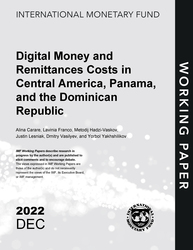
Digital Money and Remittances Costs in Central America, Panama, and the Dominican Republic
Digital Money and Remittances Costs in Central America, Panama, and the Dominican Republic
READ MORE...
Volume/Issue:
Volume 2022
Issue 238
Publication date: December 2022
ISBN: 9798400227097
$20.00
Add to Cart by clicking price of the language and format you'd like to purchase
Available Languages and Formats
| English |
Prices in red indicate formats that are not yet available but are forthcoming.
Topics covered in this book
This title contains information about the following subjects.
Click on a subject if you would like to see other titles with the same subjects.
Economics- Macroeconomics , Economics / General , Digital money , cryptocurrency , stablecoin , remittances
Summary
This paper investigates factors that predict variation in digital and non-digital remittance fees over time and across countries, exploring differences between CAPDR and other regions. The paper fills a void in the literature on how country- and corridor-specific factors relate to remittance fees at different levels of digitalization of the transaction mode. It also complements stylized facts and regression analysis with a survey analysis of the CAPDR authorities’ views on the latest developments, possibilities, and risks related to digital remittances with a view to gauging the authorities’ potential role in further reducing the cost of cross-border payments more generally and remittances fees in particular. The paper finds a clear trend of declining remittance fees across countries and at any level of digitalization, albeit they remain higher for CAPDR countries relative to non-CAPDR countries. More competition, financial and digital development in receiving countries—such as debit/credit card ownership or bank branch penetration—are associated with lower remittance fees, especially in CAPDR. The surveyed authorities actively explore the use of digital money to advance domestic payment systems, expedite financial inclusion, and lower remittances fees, yet see considerable risks, especially for preserving monetary sovereignty in CAPDR.
Copyright © 2010 - 2026
Powered by:
AIDC



